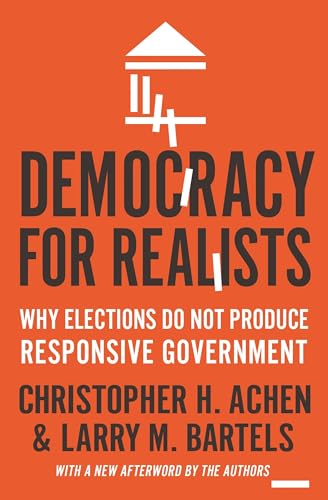Democracy for Realists
Why Elections Do Not Produce Responsive Government (Princeton Studies in Political Behavior)
Christopher H. Achen; Larry M. Bartels
BOOK REVIEW

In a landscape where politics is increasingly portrayed as a spectacle, Democracy for Realists: Why Elections Do Not Produce Responsive Government stands as a beacon of hard-hitting truth. Authored by the insightful Christopher H. Achen and Larry M. Bartels, this work tears down the curtain of myth surrounding electoral democracy and forces you, the reader, to confront a reality that's often swept under the rug. You'll find yourself grappling with a disconcerting question: Are elections truly the hallmark of a responsive government, or are they merely a performance replete with disillusionment?
The authors meticulously investigate the genesis of our democratic ideals, exposing the stark chasm between public belief and political reality. Achen and Bartels argue that voters often lack the information required to make informed choices, leading to outcomes that reflect partisanship rather than a genuine response to citizens' needs. This revelation is not just shocking; it is a clarion call for critical introspection about our democratic processes. 📉
A reader diving into this book is thrust into a whirlwind of statistics, historical accounts, and pithy commentary that will leave you questioning the very foundations of political engagement. Achen and Bartels lay bare how factors like social identity, peer effects, and deep-rooted biases shape electoral results more than informed debate or rational analysis. This isn't merely an academic exercise; it's a profound insight into why our votes often feel like whispers in the cacophony of political machinery.
The emotional force behind this book is palpable. You may find yourself oscillating between moments of anger and disillusionment as Achen and Bartels unravel the cozy narratives politicians spin around electoral responsiveness. They paint a grim picture of a political landscape where ignorance reigns supreme, and your vote is fragmented into voices that echo back the biases of your community rather than the rational choices you aspire to make. This is no sugar-coated account; it's raw, unfiltered, and essential reading for anyone who considers themselves a participant in democracy.
Yet, it's not just the doom and gloom that captivates. There's a flicker of hope and a challenge posed by the authors to transcend this cycle of ignorance and emotional myopia. They implore you to engage in critical thinking, urging you to question the narratives that govern your perceptions of political reality. It's a call to arms for the educated citizenry to reclaim democracy from the menace of apathy and manipulation.
Readers have been vocal in their reactions to this work, generating a spectrum of opinions that mirror the very themes discussed within its pages. While some hail it as a "game-changer" that brilliantly reveals the inadequacies of conventional wisdom, others argue that it may oversimplify the complexities of modern governance. On digital platforms, critiques often oscillate between enthusiastic approbation and vehement opposition, reflecting the contentiousness of the subject matter itself. It prompts you to wonder - does this book elicit discomfort because it confronts inconvenient truths, or is it overselling a bleak narrative of hopelessness?
In traversing its 424 pages, you'll be entranced by the authors' ability to wield data not simply as cold facts but as compelling narratives that resonate on an emotional level. The insights they offer can lead to a profound reconsideration of how we engage with politics. They challenge you to shake off complacency and embrace the complex tapestry of motivations that underpin electoral behavior.
The implications of Democracy for Realists extend far beyond the individual. It resonates with political movements, academic discourse, and societal structures. From rising populism to the increasing polarization in democratic societies, Achen and Bartels offer a lens through which we can examine contemporary events. Their work asks you to be not just a passive consumer of political processes but an active participant, armed with knowledge and critical acumen.
As you finish this riveting text, you may find it difficult to return to the blissful ignorance of political disengagement. Instead, you'll be left grappling with the unsettling knowledge that true democracy demands more than just casting a vote; it requires an engaged, informed, and critically-thinking populace willing to challenge the status quo.
Let this book be your guide to unmasking the often-misguided notions we hold about democracy and political responsiveness. Dive into Democracy for Realists, and don't just read - confront, reflect, and recalibrate your understanding of what it means to live in a democracy. The future of politics may depend on it.
📖 Democracy for Realists: Why Elections Do Not Produce Responsive Government (Princeton Studies in Political Behavior)
✍ by Christopher H. Achen; Larry M. Bartels
🧾 424 pages
2017
#democracy #realists #elections #produce #responsive #government #princeton #studies #political #behavior #christopher #achen #ChristopherHAchen #larry #bartels #LarryMBartels